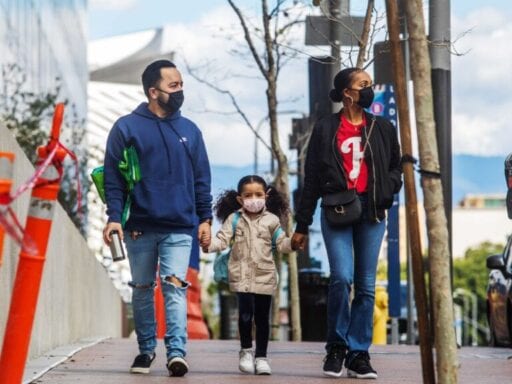Americans are more worried about their health than their finances, surveys show.
Part of the coronavirus conversation in the US is turning to the question of when to start reopening the country. President Donald Trump certainly wants to do it as soon as possible, based on the theory that the public is demanding to be let back out into restaurants and retail stores so they can resume a normal life.
But as of right now, that doesn’t appear to be true at all. Instead, Americans still seem onboard with social distancing and much more fearful about the health risks of opening up the country too soon than the economic risk of a continued shutdown. The costs of both have been awful — 31,000 dead and counting, 22 million jobs lost — but the public is first and foremost preoccupied with the public health crisis.
The Pew Research Center asked the question directly in a nearly 5,000-person survey conducted from April 7 to 12: Are you more worried about your state government lifting its restrictions on public activities too quickly or not quickly enough? By a 2-to-1 margin, Americans said that they were more worried about rapidly ramping down social distancing.
/cdn.vox-cdn.com/uploads/chorus_asset/file/19907002/PP_2020.04.16_trump_and_covid_19_2_01.png) Pew Research Center
Pew Research CenterOne likely explanation as to why there is such reluctance: Pew found 73 percent of Americans thought the worst was still to come in the coronavirus outbreak, while just 26 percent thought the worst had already happened.
Another piece of the puzzle may come from Gallup, which released its own polling on Thursday with a related finding: More Americans said they were worried about getting sick from Covid-19 than were worried about severe financial hardship because of the economic slowdown.
/cdn.vox-cdn.com/uploads/chorus_asset/file/19907010/adb4_gslmeuxxg9l7ys46g.png) Gallup
GallupGallup found that women, people who live in cities, and younger adults were most worried about the health risks.
Lower-income people saw the worst of both worlds: They were more concerned about getting sick than the people in higher income brackets and they were more fearful about economic hardships as well. As Vox’s Anna North recently reported, the ongoing pandemic has affected marginalized Americans the most, revealing the inequalities in US society in new and painful ways.
Starting to reopen society will require more testing, both to diagnose people currently infected and to identify people who’ve had the virus and recovered. We also need a better understanding of how immune people are after they fight off the virus. New applications to enable contact tracing will also help. And no matter what, it will be a slow journey back to normalcy; nobody should expect things to snap back to the way they were in the next few months. Normal life may not be able to fully resume until there is a vaccine widely available.
Opinions could, of course, change. Millions of people are now unemployed, and while Covid-19 is very infectious and can be dangerous to people of any age, it’s by far the most threatening to older people and people with preexisting conditions. The public’s calculus on health vs. economic risks might shift as lockdowns drag on, especially if officials can find ways to protect the most vulnerable.
But for the time being, this new polling indicates Americans are content with using social distancing to mitigate the health risks to themselves and their neighbors, even if it comes at an economic price.
Support Vox’s explanatory journalism
Every day at Vox, we aim to answer your most important questions and provide you, and our audience around the world, with information that has the power to save lives. Our mission has never been more vital than it is in this moment: to empower you through understanding. Vox’s work is reaching more people than ever, but our distinctive brand of explanatory journalism takes resources — particularly during a pandemic and an economic downturn. Your financial contribution will not constitute a donation, but it will enable our staff to continue to offer free articles, videos, and podcasts at the quality and volume that this moment requires. Please consider making a contribution to Vox today.
Author: Dylan Scott
Read More



